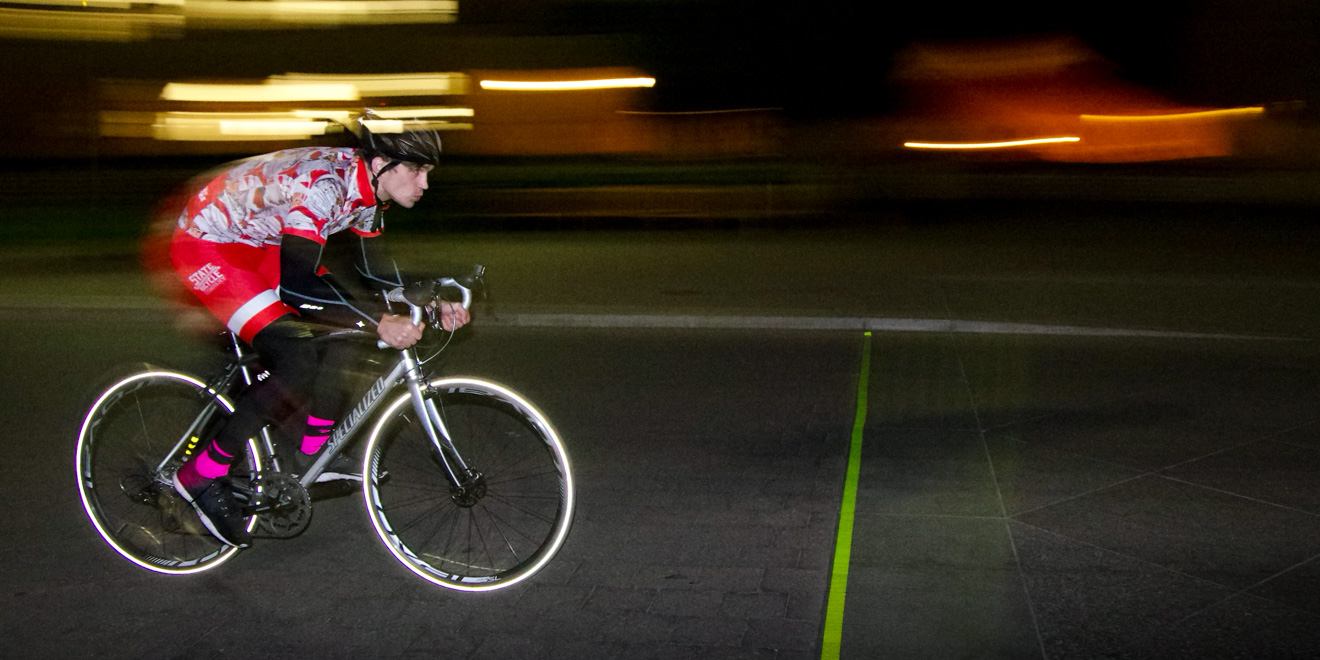Last Wednesday night, the informal cycling group Stanford Pavement Pursuit hosted its final “underground” bike race of the year. Very few Stanford students have been able to witness and participate in the group’s quarterly races, according to its group members, since knowledge of events has only been spread by word of mouth.
“If you stumble upon it, it’s like magic,” said Nina Horowitz, a second-year Ph.D student in bioengineering and one of the founding members of the group.
Pavement Pursuit started in winter quarter 2017, when Horowitz, biomechanical engineering master’s student Nicolas Castano, civil engineering graduate student Ben Lim and mechanical engineering Ph.D. student Seth Cordts decided to organize a “little bike race” with a group of friends. During their first race, bikers raced two-by-two down to the bottom of Roble garage. With the success of the first race, the four decided to continue organizing races around campus, held at night to avoid pedestrians, bike traffic and campus police.
“Everyone had such a good time, we were like, ‘We should have another one of these,’” Horowitz said. She added that the group only hosts one race per quarter, each with a different theme.
Since their first race, the Pavement Pursuit has had three other races — a “scavenger hunt” race across campus, the “Serra Street sprint” past the Engineering and Main Quads, Memorial Church and down to Campus Drive, and Wednesday’s “Devil Takes the Hindmost” race, where the last racer in every lap is dropped until only one biker remains.
“Real cycling races are kind of boring, and we wanted something that involved more fun, and that is a lot more freeform,” Lim said. “You come to have fun, but also ride bikes.”
The races typically draw a few dozen people, all with different levels of biking experience, from casual riders who use their bike to get to class to cycling team members who come wearing their full cycling kit. According to Horowitz, members of the cycling team were “too intense” for the races, so the Pavement Pursuit had to create brackets — A, B and C — for bikers of different experience levels.
However, the Pavement Pursuit does not focus solely on the racing itself. According to Lim, hosting a bike race helped bring more people on campus together, since nearly every Stanford student rides a bike. Racers shared Lim’s sentiment, agreeing that the bike race was a way to connect and have fun.
The Pavement Pursuit said they aimed to create an enjoyable environment. On Wednesday, spectators cheered on racers wearing costumes ranging from nun to dinosaur, Cardi B and Migos played from bluetooth speakers and winners received the “nerd” prize of gold spray-painted old bicycle sprockets hung on ribbons. Attracted by the spectacle, passersby like first-year law student Charlie Melman found themselves unexpectedly joining the race.
Melman, who was biking home late that night, stopped to ask what was going on when he saw bikers lined up, blocking his usual path home via Meyer Green.
“They threw me a helmet, I did a few laps, and I didn’t come in last, or even second to last, so it went okay,” Melman said.
Horowitz said that each participant is required to wear a helmet. There are also people stationed around the race path to ensure pedestrians and outside bikers do not get hit by the racers.
“It’s like a safety third, fun first, eternal glory second type of thing,” Horowitz stated.
While the Pavement Pursuit has become well-loved by participants, its future is uncertain since some organizers are graduating in the spring.
“I’d definitely come back,” Lim said.
Participants also expressed hope that future events would be planned. According to Jake Young ’15, a participant and winner of the lower-tier C bracket race, the race provides an opportunity to just “let loose.”
“It’s okay to do dumb stuff sometimes as a smart person,” Young said. “Be goofy, be like a kid again.”
Correction: An earlier version of this article incorrectly stated that Ben Lim is a mathematics graduate student. Lim is a civil engineering graduate student. The Daily regrets this error.
Contact Adesuwa Agbonile at adesuwaa ‘at’ stanford.edu and Melissa Santos at melissasantos ‘at’ stanford.edu.
